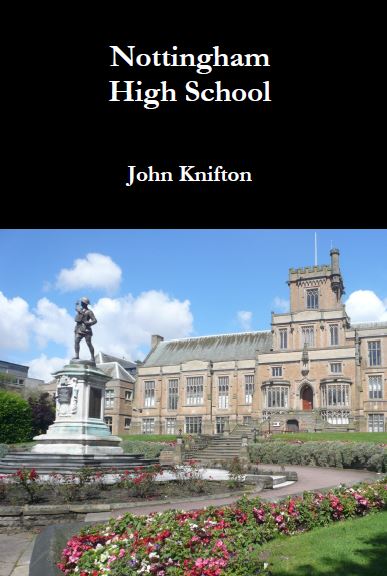Towards the early part of his career in the Royal Air Force, probably in the winter of 1941-1942, Fred was stationed for a short period at Cranwell, the RAF College. Cranwell is a very imposing place:
This episode took place at the very start of his stay there, when, in his first period of free time, Fred decided to go out on a visit somewhere.
It was a glorious, cold, clear, bright blue, frosty day, and Fred went out of the front gate of the camp accompanied by a friend. It’s difficult to miss the gates at Cranwell:
Seeing a local man pushing his bike along the road, Fred asked him the way to Lincoln, but instead of offering directions, the man just stretched out his arm and pointed along the road, which was a Roman one, and absolutely straight, to the distinctive shape of the cathedral, silhouetted sharply against the bright light of the sky. Lincoln Cathedral is on a high hill, surrounded by a flat landscape, so it is fairly difficult to miss:
The man said not a single word but just carried on trudging along with his bicycle. Fred and his friend, armed with the usual 24 hour pass, set off cycling along the road to Lincoln.
This initially unnamed friend may well have been Joe Fielding, a highly educated man who had studied, among other things, Latin at Oxford University. The two young airmen were taken around the cathedral by one of the amateur guides, who had many interesting things to explain to them. When they reached the shrine to St Hugh, at the eastern end of the cathedral, near the altar, the guide told them all about the life of the saint, and his pet swan, but he confessed that, as a modestly educated working class man, he was unable to translate the Latin inscription on one of the metal tablets near the altar. Joe, however, with his degree level knowledge of Latin, proceeded to translate the inscription fluently.
The guide though seemed to be really, really, upset. Fred felt that, while Joe’s behaviour was perhaps the product of innocent helpfulness, he should rather just have kept his mouth shut, and let the guide remain the expert. Fred was certainly highly embarrassed by the whole affair.
As one of the coincidences that fill all our lives, Fred was to pass away on the very same day that I myself took a party of schoolboys to visit Lincoln Cathedral. I was able with ease to find that single plaque written in Latin, unchanged in the sixty or so years between the two events.








So, do you know what it says?
I can do it more or less as far as line nine but after that I’m struggling. I haven’t done Latin since the Sixth Form and that is now nearly half a century ago. It says, give or take, that “Newcomen Wallis, knight, is buried here. He was taken from life on December 31st 1730, on the fourth day of illness with a very strong fever. Among his friends, nobody was more generous or more lovable.” The next sentence I can’t really do, but I would argue that the key to its meaning may not be in the photograph.
Lincoln cathedral is so beautiful and Fred must have been an understanding person. Thank you for sharing.
Yes, Lincoln is a wonderful cathedral with all types of interesting things to see, including the Lincoln Imp, the huge rose windows and the general feeling of hundreds of years of history, with the tomb of Remigius, the man who gave William the Conqueror one of his ships and soldiers to fight for him, and, on the ceiling, the names of the men who gave money to the cathedral in the Middle Ages. The oldest sponsors in history!
I enjoyed the cathedral but could not have attempted the Latin
What doesn’t help is that quite a lot of the words from the eighteenth century are unfamiliar to somebody like myself who only ever studied the Latin of the Ancient Romans. Nothing later than 100 AD!
Lincoln is a wonderful cathedral and would be a lot for famous if it was nearer to London. I have taken school groups there on many occasions, and every time you get a different guide who tells a different set of stories.
I once set an advanced cryptic crossword for the Times Listener based on the Lincoln Imp
That plaque makes a unique connection between you both. The cathedral itself is quite an imposing structure looking over the town,.
Yes, and it was particularly poignant that he died in the early morning hours of the very day when I was taking a group of boys to see the cathedral. The building itself is on a steep hill and was a landmark for every single returning Lancaster during WW2.
I think that the flyers from every single base had their major feature to look out for. When he was training, it was the lighthouse at Lossiemouth, and at Elsham Wolds it was Read’s Island, the only island in that part of the River Humber.
The pictures of Lincoln on the landscape is beautiful, and as you say, imposing. I was thinking of how awesome to see the plaque in Latin. In high school, it was an option, but no schools anymore teach Latin. I’m impressed when anyone is able to speak it. A shame, but it does seem to be a dead language. Do they teach it in England still?
I would be surprised if there were any state schools which still did Latin. There are a diminishing number of private schools which continue to do it, and the very top schools such as Harrow, Eton, Repton and so on will all do Latin and probably Ancient Greek as well,
If you want to study Latin, the commonest route now would be to take it up at university. I absolutely loved Latin and I realise now that if I had gone to university and done Latin rather than Russian I would have got a better degree, because Latin is easier than Russian. In my youthful stupidity, though, I did what I thought was interesting rather than what was profitable.
I think it goes onto to say that: “while he may have had his vices, he was a man after all, the community benefited from his many virtues”.
Latin is a language as dead as dead can be, it killed the ancient Romans and now it’s killing me.
That said I have long believed that all children should do some Latin.
I believe you! To be honest, the first sentence took me so long that I was loath to carry on. I think that the problem with Latin is that there are seldom enough people in any given school year who want to learn Latin, and the majority of children are attracted by the cheap disco glamour of French, German or Spanish.
You learn a lot more about languages in general from Latin, though, than from any of the big three. It may all be academic, anyway, though, because even Modern Languages are fast disappearing, with ever smaller numbers of candidates year on year.
Coincidences like this certainly do fill our lives. My grandmother died in a rest home that was built on the very site where my grandfather had a cobblers shop! It’s nice you have that link yourself.
Absolutely agree with you. And I have always thought that coincidence was the Universe calling out to us, and saying “There is some pattern to all this. It’s not just some total random snowstorm of events as you may have started to think.”